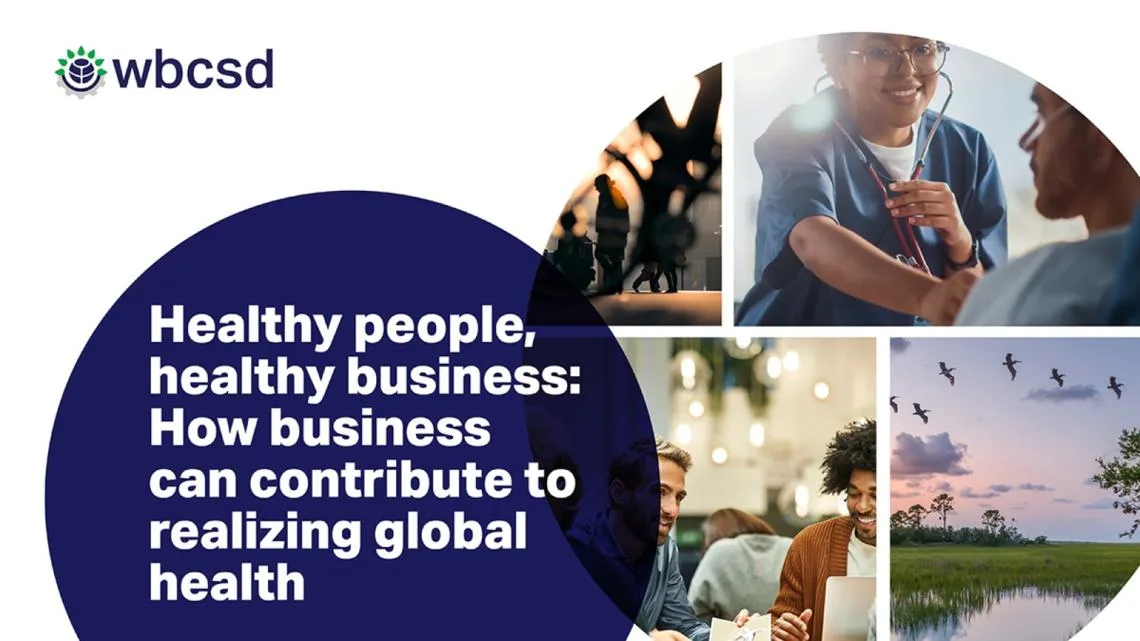Geneva, 31 October 2022 – Business contributions to realizing global health are spotlighted today as the World Business Council for Sustainable Development (WBCSD) launches its flagship “Healthy People, Healthy Business” report.
This report, developed over the last two years with 23 WBCSD member companies as part of the Healthy People, Healthy Business coalition, explores how businesses across a wide range of sectors can play a pivotal role in developing and driving the uptake of solutions to global health challenges and how business can protect, promote, and nurture health.
Over the last decade, unprecedented global shocks have resulted in deeper awareness of the fragility of our planet and of humanity. A healthy climate, nature, equity, health and wellbeing and equity are deeply interrelated and co-dependent. As such, our responses must also be interrelated.
The world is off-track against many of the targets embedded within the Sustainable Development goals (SDGs), and business can play a critical role in changing this trajectory through swift and sustained action. Failing to do so represents existential threats, as has become evident during recent turbulent times, as well as considerable legal, reputational and operational risks. On the other hand, by tackling their impacts on health and wellbeing, companies can better manage risks, address stakeholder expectations including heightened investor scrutiny, reap a host of operational benefits and contribute to building happier, healthier and more prosperous societies.
The “Healthy People, Healthy Business: How business can contribute to realizing global health” report makes the interconnected opportunities evident and shows how businesses worldwide can pragmatically build health and wellbeing into everyday operations across functions and geographies. This broad outlook spans from embedding a culture of health and wellbeing in our workplace to the consumers we serve and from building resilient and accessible healthcare systems to accelerating action on climate, nature and equity. With over 13 business case studies from WBCSD member companies clearly illustrating impact opportunities.
The insights and findings of the “Healthy People, Healthy Business” report act as a call to action and are a strategic tenet for any company, regardless of function or geography.
“This report summarizes the findings of companies from across sectors highlighting that embedding a culture of health and wellbeing in corporate culture and business strategy helps manage risks, deliver operational benefits, address stakeholder expectations, and build happier, healthier more prosperous communities and societies. Climate change and nature loss lead to rising air pollution, heat waves, and droughts which impact the health and wellbeing of millions worldwide, and disproportionately harm society’s most vulnerable. Health and wellbeing are critical components for sustainability, business success and a liveable future.” Diane Holdorf, Executive Vice President, WBCSD.
“The climate crisis is a health crisis, and underserved populations are at greatest risk. Biogen is already taking action on recommendations from the Healthy People, Healthy Business project by working to go fossil fuel free, promoting a culture of wellbeing in our workplace, helping health systems promote climate resilience, and advocating for urgent action. We’re honored to work with WBCSD and other corporate leaders to help make climate, health and equity everyone’s business.” Johanna Jobin, Global Head Corporate Reputation & Responsibility, Biogen
“For us, it’s obvious that when our People are physically and mentally safe, they can deploy their full potential toward reaching and even exceeding our business goals. People, Planet and Performance are our three essentials, the ones that will drive sustainable business in the future and that we are proud to nurture.” Hervé Tiberghien, Chief People Officer, Solvay
For more information about our Healthy People, Healthy Business work, please contact: Alyson Greenhalgh-Ball, WBCSD
WBCSD news articles and insights may be republished in accordance with the Creative Commons Attribution-NonCommercial-NoDerivatives 4.0 International Public License, and in accordance with our Privacy Policy. All Content must be featured with due credits.

